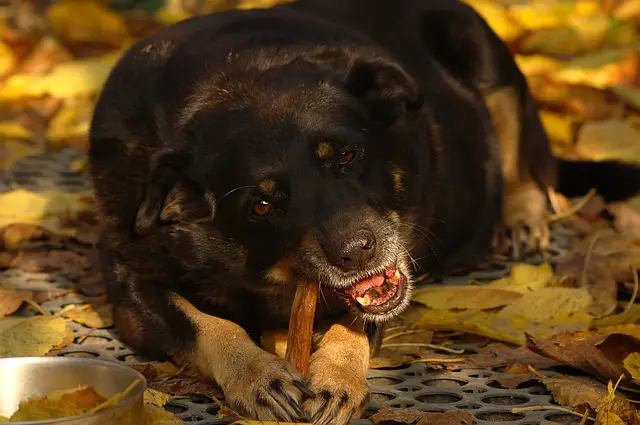So, your puppy can’t seem to get enough of their food. Mealtime is an exciting time. Our insatiable appetites are a product of our evolution from wolves where we would hunt and scavenge anything we could to fill our bellies. Thankfully, we don’t have to do that anymore and can rely on our pet owner to provide us with everything we need.
That doesn’t change the fact we can be gluttonous, especially when we’re puppies. But what happens when the transition from a puppy to an older dog arrives, and we suddenly don’t like the new pet food our owners are giving us?
At this point, you might look at the ingredients on the back of that bag of puppy food and think the new food seems just as good, if not better, than the adult food you are trying to transition to. But can your adult dog eat puppy food?
Understanding the Difference Between Puppy Food and Adult Food
As dogs grow and mature, their dietary needs begin to change. Each life stage requires different nutrients to ensure they continue to grow properly and remain healthy throughout their life. Because of this, there are some major differences between puppy food and adult food.
- Protein Intake – Protein is the major source of energy in any dog food. Since growing puppies require a significant amount of energy, these protein levels are usually much higher in puppy food. As a puppy grows into an adult, the energy levels needed to maintain a healthy body will begin to drop.
Most adult dog foods contain a protein content somewhere in the area of 18%. That percentage will most likely increase if you own a larger breed of dog like a Rottweiler or a Great Dane, but most adult dogs require this lower protein content.
Puppy food, on the other hand, has a much higher protein content, usually in the range of 30%, or almost double that of adult food. Not only does a puppy use this protein for energy, but it plays an important role in both the growth and repair of bones and muscle tissue.
Protein can be considered one of the most important factors when it comes to food for your growing pup, but it becomes less important as they grow and mature.
- Fat Intake – Not only is fat another important factor when it comes to energy for your puppy, but it also helps with their growth cycle and builds that layer that keeps them warm.
Because it does play a major role in growth, fat content is slightly higher in puppy food than in adult food, with a typical percentage being in the range of 22% to 24%. Adult food, meanwhile, usually contains 18%.
Fat is a very dense form of energy that highly active pups have no problem burning off. As they grow and transition into adulthood, though, their metabolism will start to slow down. Therefore, fat content in adult foods is lower, and that is also why adult dogs that are eating foods with higher fat content are more prone to putting on weight.
- Calorie Intake – To grow at the proper rate, puppies require a specific amount of energy. The calorie content in puppy food can seem remarkably similar to that of adult food, in the range of 300 to 400 calories per cup (an adult food is usually in the range of 200-400 per cup) but remember that puppies will often be fed more food per meal than adult dogs, therefore their caloric intake is much higher.
The way a puppy uses those calories is different from that of an adult dog as well. Where an adult dog uses them for movement and to maintain muscle mass, a puppy uses calories to grow and build that muscle mass. Understandably, maintaining and building muscle mass require different amounts of calories.
- Calcium Intake – Calcium plays a major role in the proper development of a puppy’s teeth and bones. It’s also important in maintaining bone health as a dog grows, but like calories, a lower intake is needed to maintain than it is to grow.
Growth means that puppies require much larger amounts of calcium compared to adult dogs. Typical puppy foods will contain upward of 18 grams of calcium, whereas an adult food will contain a maximum of one gram.
The difference can be dangerous, and that much calcium for an adult dog can lead to multiple bone issues that can be extremely painful and reduce a dog’s mobility.
Side Effects of Feeding an Adult Dog Puppy Food

The short answer to the question can an adult dog eat puppy food is yes, they can. However, that answer is very vague. Consider puppy food as junk food for an adult dog. Can you feed puppy food to your adult dog? Yes. Should it be used as a consistent food? No. Now, you might be thinking, puppy food has higher contents of everything a dog needs, so it must not be that bad. But don’t let those ingredients fool you, as there are a couple of serious side effects that puppy food can have on your adult dog.
- Obesity – High-protein, high-fat, and high-calorie food may seem like a good thing, and maybe for some adult dogs it is, but for most, their metabolism slows down considerably as they grow older. This means that they can’t process all of the extras the way that a growing puppy can. The fat content plays a major role in an adult dog becoming obese.
That extra fat doesn’t get broken down and instead gets stored and becomes unused in the body, leading to weight gain and, eventually, obesity.
- Calcium Overdose – The biggest difference between adult dog food and puppy food is the calcium intake, as we’ve already touched on. Puppies need large amounts of calcium to promote proper bone growth. While an adult dog needs to be able to maintain its bones, the amount of calcium needed to do so is significantly lower.
The minimum calcium needed as a puppy is two grams, which is already higher than the maximum amount required for adult dogs. Regularly giving food designed for puppies to an adult dog will lead to calcium overdose because they are receiving calcium at a rapid rate.
Not only will too much calcium lead your adult dog’s bones to become very painful, but it will also result in reduced movement and mobility, as well as a less than optimal life.
Certain Situations When it May be Good for an Adult Dog to Eat Puppy Food

Even though consistently feeding an adult dog puppy food isn’t necessarily good for them, and it could lead to some health issues, there are some exceptions to the rule and times where it may be good for your adult dog to eat puppy food.
- Your Adult Dog is Underweight – If, for whatever reason, your adult dog is struggling to put on weight, then feeding them puppy food may be a solution. Because puppy food contains higher levels of protein, fat, and calories, it can sometimes be a surefire way for your dog to put on some needed weight. It does come with the downside of extra calcium, so be sure to consult your vet – who may be able to recommend options with lower amounts of calcium – before changing to puppy food.
- Your Adult Dog is Weak or has Low Energy Levels – Weakness isn’t something that just happens. It is usually associated with some sort of illness or injury, or it can even be associated with your dog reaching the senior stage of their life. While puppy food can go a long way in improving your pet’s energy levels, it’s important to properly assess the situation before changing foods. As an example, a senior dog may be low on energy, but require a certain food that is lower in fats.
On the other hand, dogs that are recovering from a long-term illness or injury can benefit greatly from the higher protein, fat, and caloric intake that a puppy food offers. The higher percentages will help with the growth of new, healthy tissue as well as increase the energy they may have lost while sick.
It’s important to note that dogs that are recovering are more vulnerable than healthy canines, and it can be easier for them to become susceptible to issues associated with feeding an adult dog puppy food. Illness and injury should not be used as a time to experiment with food. Instead, consult a vet and see if puppy food is right for your recovering dog.
- Your Dog is Pregnant or Nursing – There are a couple of reasons your pregnant and weaning dog needs higher levels of energy. While in the womb, puppies are relying on the nutrients from their mother to properly develop their entire bodies. They are draining their mother of her nutrients, so it can be very important for a pregnant dog to have extra protein, fat, and calories. This is not to just support her puppies, but herself as well.
The same can be said for mother dogs that are nursing. After a puppy is born, they still rely on their mother to provide them with all of the nutrients needed for proper development. This can take a lot out of any dog, and, as a result, nursing dogs need to have extra nutrients to stay healthy and provide for their pups.
Under normal circumstances with healthy dogs, puppy food should be treated as if it is junk food and should not be given as regular food for adult dogs. In the short term, puppy food will have no adverse effect on adult dogs, but in the long run, it could cause serious health issues. There can be exceptions to that rule, though. So, there isn’t an easy answer to the question can an adult dog eat puppy food. The important thing is that you consult with your vet if you’re considering making a change. Other than you, the owner, a vet knows your dog the best. They will know precisely the nutritional needs your pet requires.
